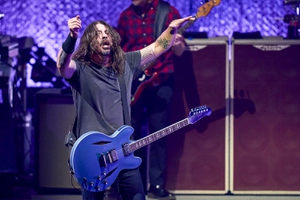When the Las Vegas Philharmonic announced in April that Donato Cabrera would be its next conductor and music director there were many references to “homecoming.”
Cabrera’s family has been in Las Vegas for decades and he himself had moved to Las Vegas as a child, living here before moving to Reno where he would attend junior high and high school.
By then he’d fallen in love with classical music and knew he wanted to be a conductor. What he didn’t know, and couldn’t know back then, is that he’d someday be standing before audiences back in Las Vegas.
In addition to conducting the Las Vegas Philharmonic, Cabrera is also resident conductor of the San Francisco Symphony, and music director of the San Francisco Symphony Youth Orchestra, the California Symphony and the New Hampshire Music Festival.
Why the Las Vegas Philharmonic? I have always wanted to find a way to come back and work there. I spent the first 10 years of my life there, so I feel very connected and I still have family that lives in Las Vegas. It’s a fantastic group of musicians, and there is an excitement and an interest by the board, by the administration and other constituents to move forward and make the Vegas Philharmonic more integrated with the cultural fabric of Las Vegas. Lastly, the Smith Center.
Do you plan to move here? My wife and I are going to start looking at communities and what it would mean to have a residence in Las Vegas. We want to have a residence in Las Vegas.
You’re a bit different than the orchestra’s previous conductors in that you have a strong interest in presenting new music. Why the interest? In New York when I graduated there were a whole bunch of us looking for opportunities to perform together—musicians and our friends who had gone to school as composers. We decided to form a contemporary music ensemble so that we could perform music that was basically the music of our friends. It became immediately clear to me that it’s so exciting to be in the room with a composer of music that has just been written.
How important is it that audiences are exposed to newer music? All of the other art forms are still predominantly creative arts. When you go to an art gallery, by and large the art you’re experiencing is art of living artists. [Orchestral] music is the only art form that has become truly stuck with art that was written hundreds of years ago. Very little of it is new. In order for it to survive, there needs to be an interest especially by musicians to promote and perform music by living composers. Maybe there is another Mozart out there just waiting to be performed, but we will never know unless we do it.
You also have a background in opera, particularly as associate conductor of the San Francisco Opera for three years. How has that influenced you as a conductor? Conducting opera is essential in becoming a thoroughly effective conductor—to be able to work with the world’s greatest voices and to understand how the human voice creates music. You often hear “that cellist sang” or “the violinist was like a great soprano.” Really, every goal of every instrumentalist is to make it sound like the human voice or to sing. To translate that into your conducting is essential.
How did you get into music? Both of my grandmothers were instrumental in my upbringing. My father’s mother in LA played the piano, and she was sort of the life of the party because she could sit down and play quite a few tunes. There are pictures of me sitting on her lap with my little hands above her hands as she played the piano. And so when I was around 8 or 9 I requested that I begin piano lessons and my parents obliged. They bought an upright piano for me, and that’s how it began.
My other grandmother, who lived in Las Vegas, really supported me in my exploration of classical music. She bought me my very first CD player for my 13th birthday and a few classical CDs. She liked classical music and would go to the performing arts series at UNLV, and she bought me my very first French horn.
The upcoming season includes warhorses, but you’re also sprinkling in works by living composers. How do you think audiences will respond? The culture of Las Vegas is one of adventure and trying new things because it is a new city. I want to tap into that sense of newness, of adventure and experimentation in a way that maybe has not been done before.
What I hope to achieve is a sense of trust with the audience, that in the journey we’re going to take over many years, each concert will be presented with passion and at the highest level. You know you’re going to love that Beethoven symphony, but there’s something new on that program by a composer you’ve never heard of.








